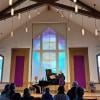
Flutist Stacey Pelinka doesn’t want to specialize. She prefers to be adventurous and to perform a full spectrum of repertoire, believing different types of music inform one another. As one of the 17 members of the Bay Area’s Left Coast Chamber Ensemble, she likes that the group plays both classical and contemporary pieces, some that are well known and some that are rarely heard.
Local audiences will have the chance to experience that eclectic range of music when LCCE presents its first-ever festival, scheduled for Friday, Jan. 24, through Sunday, Jan. 26, at various Berkeley venues, before being reprised the following weekend, Jan. 31 through Feb. 2, at San Francisco’s Noe Valley Ministry.
Billed as an exploration of the human journey, the Winter Wandering Festival marks a major undertaking for the ensemble, which has been performing since 1992. Pelinka calls the concerts a way to shake things up, while violinist Anna Presler, another longtime LCCE member, says she hopes it will be “a great big music party.”

Matilda Hofman, the group’s artistic director, explained that while late January and February may be an unusual time for a music festival, winter is nonetheless a good season to contemplate where we are in life.
“I find it’s a reflective time of year, looking back and looking forward,” Hofman told SF Classical Voice via Zoom from her Davis home. “It’s a time in the yearly cycle which can be meaningful, I think, for the community (to come together) and to invite people into artistic spaces.”
The program that opens the Berkeley run of concerts and closes the San Francisco series speaks to the theme of finding connections between opposites and extremes. It pairs Franz Schubert’s 1828 String Quintet in C Major with Italian avant-garde composer Luigi Nono’s 1989 “Hay que caminar” soñando (You must walk dreaming) for two violins.
Hofman believes both works — among the last that their respective composers wrote — convey a mixed sense of beauty and unease.
“By taking two composers from completely different centuries and juxtaposing their very late music, we’re noticing these psychological connections,” she said. “How they’re approaching life and how their music connects as well.”
Nono’s piece introduces the idea of an artistic journey, with the performers tasked with moving around the stage while playing, a setup the composer explored in his later music.
“He’s a greatly underperformed composer in the United States, but he’s so relevant today,” Hofman said of Nono. “And there’s a necessity right in the title of (his) piece. We have to go on this journey, and we have no choice but to go on this journey.”
In that frame of mind, LCCE is also preparing another big piece from Schubert’s later output, the song cycle Winterreise (or Winter Journey). Guest tenor Kyle Stegall is on the bill to sing the work on Sunday, Jan. 26, in Berkeley and Jan. 31 in San Francisco.
“Schubert’s late work has that feeling of going where the dark and ecstatic sides of life exist very closely together,” Hofman said. “Especially with Winterreise, there’s a physical journey, and then there’s a mental journey. There’s a huge feeling of transcendence and mysticism by the end of it, and one gets to go through the process of suffering that Schubert was also going through in his own life.”

The musicians of LCCE are willing to put themselves in uncomfortable or unfamiliar situations as well. For example, the festival program titled “A Dark Matter” — slated for performances on Sunday, Jan. 26, in Berkeley and Feb. 1 in San Francisco — is expected to feature Oakland artist Adrian Arias live painting to music by Benjamin Britten, Tōru Takemitsu, and other 20th- and 21st-century composers.
Then there’s “Echo Contest … Nearly,” a site-specific program that will have a single performance on Saturday, Jan. 25, at Berkeley’s First Church of Christ, Scientist, a national landmark designed by famed Bay Area architect Bernard Maybeck (perhaps best known for creating San Francisco’s Palace of Fine Arts). The free concert will combine music by San Francisco composer Danny Clay and 2022 Pulitzer Prize winner Raven Chacon in an improvisatory setting where the performers will intermingle with the audience.
Pelinka, in an interview from her home in El Sobrante, said that she has always enjoyed how LCCE happily tears down the fourth wall.
“The idea of spreading out, breaking apart the stage, and turning the whole room into the stage, and the audience is part of the experience — I think that’s really interesting,” she said. “The Raven Chacon piece that we’re playing at the same time as the Danny Clay moves around the space. It’s a game, with one person playing and the other person trying to find them.”

Presler, who lives in Berkeley and spoke to SFCV from Sacramento, where she teaches music at Sacramento State, brought the conversation back to the more traditional repertoire that’s planned.
She said she’s “feeling very fired up” about Schubert’s String Quintet after thinking it would be a nice if staid piece to revisit during the festival. ”Playing it, I’m just astonished all over again at what a remarkable piece of music it is. There are several different things going on at the same time, and somehow he’s written it so you can hear them all. It’s like magic.”
Music she’s been performing for decades, Presler said, can be enlivened by playing it in conjunction with new works, the way LCCE’s festival encourages. The combination is good for audiences, too.
“They get something fresh, that’s current, that they don’t know at all. But they also get something that’s so familiar,” she said. “And you know, music has some kind of special thing with the brain, with the deep memories of it that are sunk in there in some very interesting ways.”
This story was first published in Datebook in partnership with the San Francisco Chronicle.




